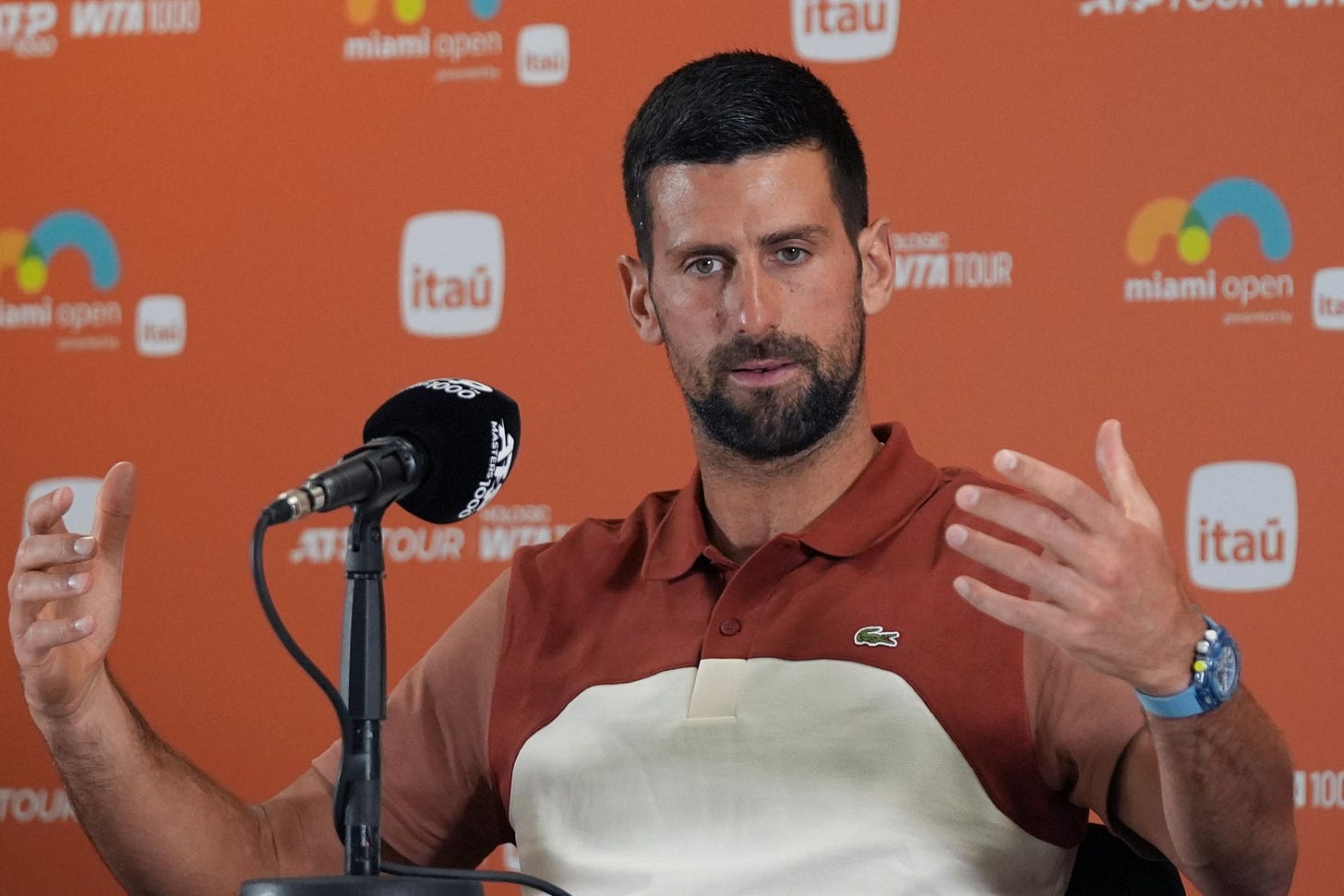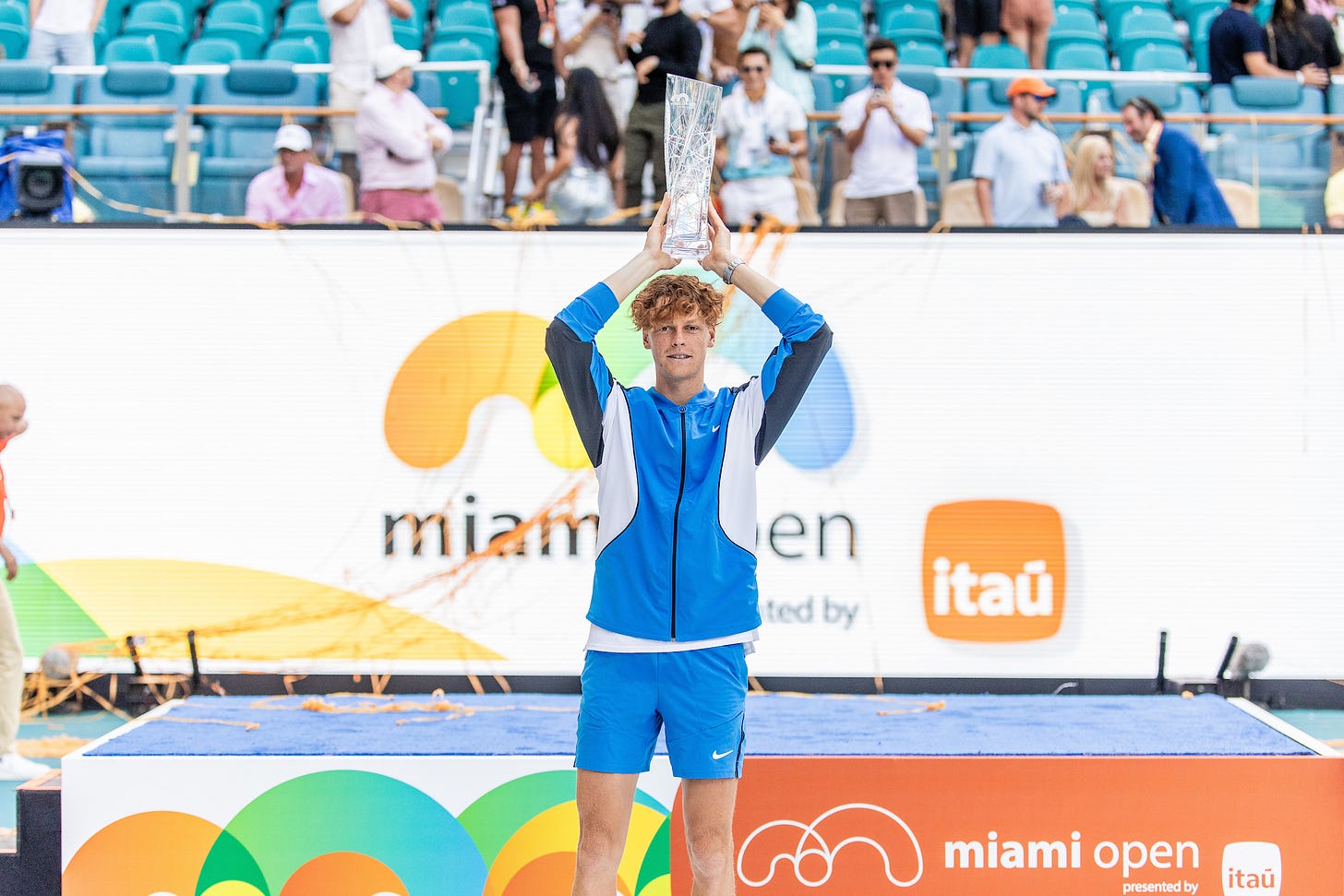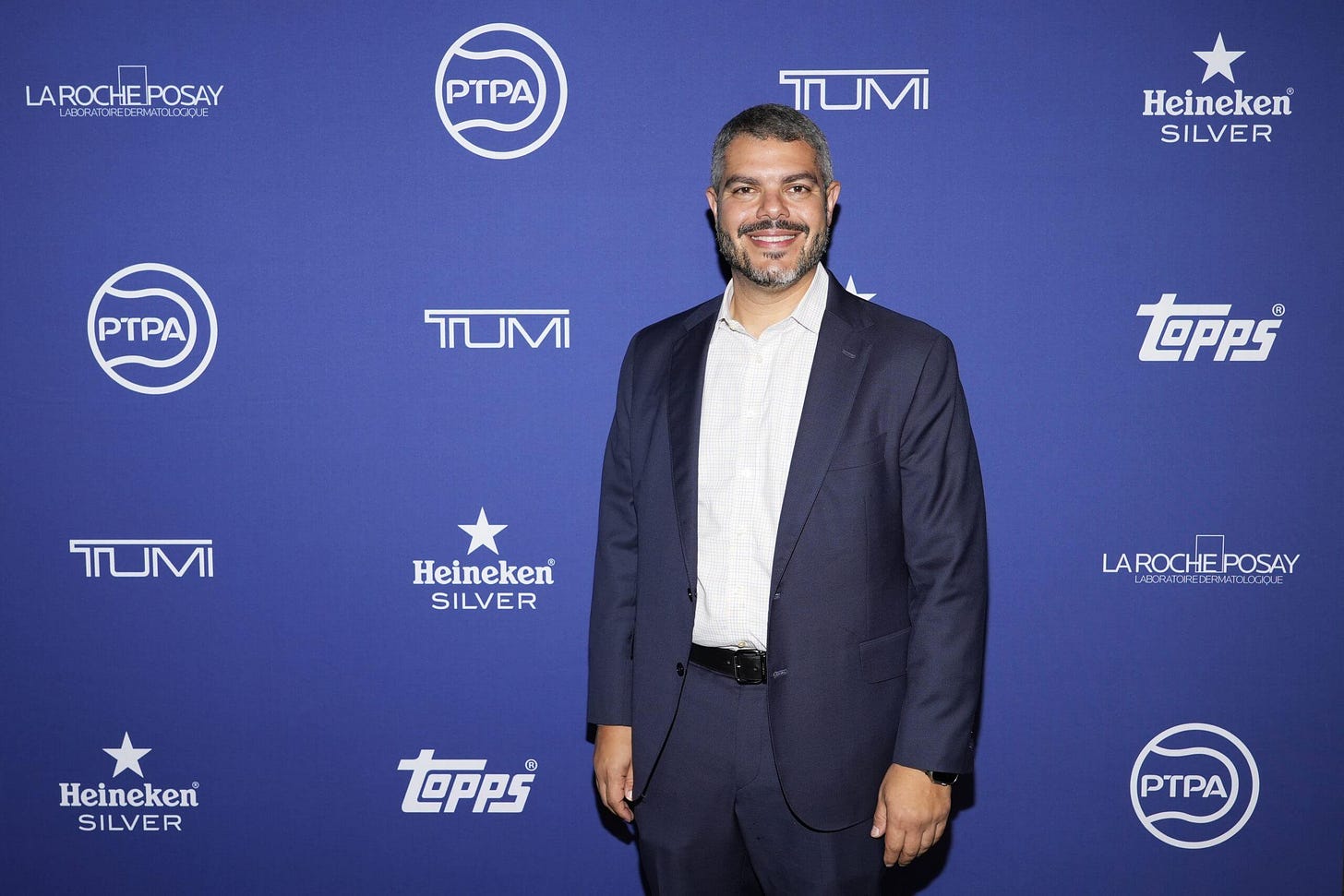Change Afoot Amid Miami Open
As the stars play in the second "Sunshine Slam," Novak + Co. — aka the Professional Players Tennis Association (PTPA) — are taking their chances in a different court

It was the thud heard round the world as the 163-page document hit the docket on March 18 in the United States District Court in Southern New York against the four main bodies of tennis, followed by a back-spin drop shot two days later, which prevents those associations from speaking to any players they represent.
As the Miami Open carries on in Florida, the real action concerning the future of tennis is taking place in Manhattan where the Professional Tennis Players' Association (PTPA) — a players “union” led by Novak Djokavic and Vasek Pospisil — filed a rather large motion asserting that the Women’s Tennis Association (WTA), the Association of Tennis Professionals (ATP), the International Tennis Federation (ITF) and the International Tennis Integrity Association (ITIA), alleging that all four groups ran a “rigged game,” which grants its players “limited control over their own careers and brands.” The lawsuit also criticises the schedule, ranking systems and control over image rights. The gut serve came on Friday, when the PTPA sought an additional court order to prevent the ATP from engaging in "improper, coercive or threatening communications" with players, alleging that the ATP has tried to force players into signing statements saying they had no prior knowledge of the PTPA’s legal action.
The main lawsuit cites “anti-competitive practices and a blatant disregard for player welfare” — among other matters — while the PTPA’s follow asked Judge Margaret Garnett to issue an order which prevents representative of all four defendant groups from communicating with players about their involvement in the process. The motion also accuses the ATP of taking action to reduce prize money and pension contributions to offset the legal fees it will rack up from fighting the case — the PTPA called it “flagrant interference” on the court’s jurisdiction.
News from the Miami Open
It’s been the tournament of Americans and upstarts in Miami, as upstart Hailey Baptiste (WTA No. 98) nearly took out three-time Grand Slam winner Naomi Osaka (WTA No 61) in three sets in the third round — the young Haitian-American’s best major tournament result to date. American Amanda Anisimova (WTA No. 17) ruined Mirra Andreeva’s (WTA No. 6) chance at winning the “sunshine slam” in three sets; Jessica Pegula (WTA No. 4) prevailed over Anna Kalinskaya (WTA No. 33); and Danielle Collins (WTA No. 15) put off retirement for another week by beating Swiss player Rebeka Masarova (WTA No. 168), who also had the best run of her career, in three sets. Italian Jasmine Paolini (WTA No. 7) helped an injured Ons Jabeur (WTA No. 30) off the court after the Tunisian pulled her calf — “The evil eye haunts Jabeur: she abandons in Miami after getting injured against Paolini” was one headline — and in a surprise turn of events the other Polish player, Magda Linette (WTA No. 34) advanced into the Round of 16 along with Brit Emma Raducanu (WTA No. 60).
But on Monday, all the Americans, including Coco Gauff (WTA No. 3), fell except Jessica Pegula, who will play Raducanu today. Filipino qualifier Alexandra Maniego Eala (WTA No. 339) has been playing the tennis of her life, notching easy wins over Jelena Ostapenko (WTA No. 35) and Madison Keys (WTA No. 5), but today faces the punishing spin of Iga Świątek (WTA No. 2). The other Pol in the quarterfinals (yes, I said that correctly) Linette is up against Paolini, and lastly, Aryna Sabalenka (WTA No. 1) will be exchanging a frosty handshake — win or lose — with Qinwin Zheng (WTA No. 9).

On the men’s side, Taylor Fritz (ATP No. 4) led a small field of Americans into the fourth round, which include Brandon Nakishima (ATP No. 32) and surprisingly, Seb Korda (ATP No. 25), as hoepfuls Francis Tiafoe (ATP No. 17) and Reilly Opelka (ATP No. 114), who is still mounting a comeback after nearly two years off the tour, ended their rund in the third round. Meanwhile, with Jannik Sinner still out of the running until the Italian Open in May, Australian Alex de Minaur (ATP No. 11) continued his steady climb toward the top by besting new kid in town, Joao Fonseca (ATP No. 60). Frenchman Gael Monfils (ATP No. 46) is still going strong and headed into the Round of 16 against Korda, while there is no English man left standing with both Jack Draper (ATP No. 7) — the Indian Wells champion — and Jacob Fearnley (ATP No. 83) taking a beating from Alexander Zverev (ATP No. 2).
Back to the lawsuit…

The Djokovic-endorsed class-action lawsuit — a legal proceeding where one or more individuals sue a defendant on behalf of a larger group (the “class”) who have suffered similar harm — so far names 12 players: “established superstars, journeymen, and relative newcomers from around the world.” The most conspicuous name missing on the actual complaint, however, is Djokovic, who has said through PTPA Executive Director Ahmad Nassar, that he has chosen to put the focus on the players instead of him. The PTPA filed similar lawsuits in the UK and the EU to end what it considers the “unchecked authority of the sport's governing bodies”
"Tennis is broken," Nassar told the BBC in October, while hinting that the PTPA would not shy away from taking their demands from tournaments to a higher court. “Behind the glamorous veneer that the defendants promote, players are trapped in an unfair system that exploits their talent, suppresses their earnings, and jeopardises their health and safety. We have exhausted all options for reform through dialogue, and the governing bodies have left us no choice but to seek accountability through the courts.”
Friday's motion claims that after the ATP learned of the lawsuit, personnel initiated a series of meetings and conversations at the Miami Open. It asserted “the ATP officials have threatened players with adverse consequences for participating in this action.” The PPTA say an expedited decision — to prevent defendants communicating with players — is necessary so players can make "informed decisions about their participation in this case, and fully and freely pursue their legal rights without undue influence by the same parties who control their pay cheques…”

In summary, the PTPA lawsuit accused the WTA, ATP, ITF and ITIA of the following:
Collusion to Reduce Competition, saying all associations have entered into agreements and arrangements to suppress competition between and among tournaments that could provide players with increased earning opportunities.
Fixing Prize Money and Suppressing Player Earnings, accusing all associations of colluding to cap the prize money that tournaments award and limit players’ ability to earn money off the court, rather than allowing a free market to dictate the amounts that players earn. It added that two billion people across 200 countries watched professional tennis matches last year, yet top tennis players earn 17 percent of revenues as compared to other sports, such as golf, basketball, and American football, which range between 35 and 50 percent. It cited the U.S. Open “Honey Deuce” cocktail, as an example, a Grey Goose Vodka drink that made $12.8 million for the tournament, or more than it paid to both singles champions combined.
Ranking Points Mandates, asserting that the various associations impose a draconian system of “Ranking Points” that dictate which tournaments players can compete in, how much compensation they earn, and whether they receive certain sponsorship opportunities. “The system funnels players away from any alternative events that could exist in a free market, and forces them to compete only in Defendants’ tournaments if they are to play professional tennis at all, the complaint states.
A tour video on Instagram by Jessica Failla showing the conditions at an ITF Futures tournament in Delhi India.
Forcing an Unsustainable Schedule, claiming that he professional tennis season stretches 11 months of the year, leaving little to no room for players to rest and recover. “The unsustainable schedule requires players to travel on their own dime and handle their own logistics to participate in dozens of tournaments across six continents. Spending time with family or recovering from injuries requires forfeiting opportunities to earn a living and earn coveted rankings points,” the lawsuit states, adding another reason for the lawsuit as player disregard, adding that in 2024, players were forced to compete in 100-degree heat, endure matches that ended at 3 AM, and play with different and injury-inducing tennis balls depending on the week, leading to chronic wrist, elbow, and shoulder injuries.
Exploiting Players Financially and Violating Privacy Rights, accusing the WTA, ATP and ITF of forcing players forced to sign over their name, image, and likeness (NIL) rights for zero compensation, allowing governing bodies to profit from their identities while preventing them from securing certain independent sponsorships, and baselessly limiting the number of sponsors that they may have. It adds that the ITIA subjects players to invasive searches of personal devices, random middle-of-the-night drug tests, and interrogations without legal representation. “The ITIA has suspended players without due process based on flimsy or fabricated evidence. Players’ phones are confiscated and searched without consent—a gross invasion of privacy which violates the law and further demonstrates the stranglehold the Defendants have over the market.”
Another tour video on Instagram by Jessica Failla showing the accommodations at an ITF Futures tournament in Delhi, India.
So what does the PTPA want from these various associations? “… fairness, safety, and basic human dignity,” Pospisil said “I’m one of the more fortunate players and I’ve still had to sleep in my car when traveling to matches early on in my career — imagine an NFL player being told that he had to sleep in his car at an away game.”
Essentially, the players are saying that they are contract employees who have been treated poorly by their “bosses” — the WTA, the ATP, the ITF and the ITIA for years. Citing antitrust violations under Sections 1 and 2 of the Sherman Act, the lawsuit demands that the monopoly — or as it has said, a “cartel of tour organizers and tournament operators” — be stopped from operating over the services of professional tennis players and that the players are properly compensated for the injuries they’ve suffered. The most likely outcome is a starting point for negotiations and a settlement favourable to players.

In the meantime, however, the ATP has accused the PTPA of “consistently chosen division and distraction through misinformation over progress” adding that it “remains committed to working in the best interests of the game.” A spokesperson added: “We are aware of the request for an additional court order being sought by the PTPA and refute its assertions. At the heart of ATP is our commitment to players. As this is now a legal matter we have no further comment to make.”
The WTA said it will defend its position and said in a statement the legal action is "both regrettable and misguided,” said the WTA. “Contesting this baseless legal case will divert time, attention, and resources from our core mission, to the detriment of our players and the sport as a whole."



